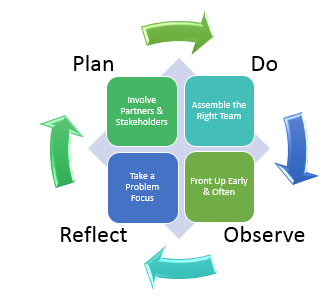Success Principles
Research into successfully delivered science* has shown that a number of key ‘success principles’ are a strong indicator of impact. The diagram below illustrates these.
*See Turner, J. A., Klerkx, L., White, T., Payne, T., Everett‐Hincks, J., Mackay, A., & Botha, N. (2015). 'Unpacking systemic capacity to innovate: How projects coordinate capabilities across agricultural innovation system levels' INRA ImpAR Conference, 3-4 November, Paris.
The principles are also outlined and explained in the brief video below.
Our Co-Innovation Guide shows how the success principles, outlined below, can be built in to research projects.
 |
INVOLVE PARTNERS & STAKEHOLDERS Agricultural research is addressing increasingly complex problems the solutions to which require changes in farm systems and off-farm systems, in addition to technological changes. Read more. |
 |
In addition to technical skills for quality science and good project management, additional skills are desirable in research projects. Read more. |
 |
Taking a problem focus begins with identifying the issues (or opportunities), then continuously checking for and prioritising new issues or opportunities during the course of research. Read more. |
 |
Fronting up involves researchers meeting with shareholders (next and end-users) to share updates and results early and regularly throughout research projects. Read more. |
 |
Action learning involves an on-going cycle of “plan-do-observe-reflect-plan” in projects. Observing involves monitoring project actions and progress toward solving the problem. Read more. |

